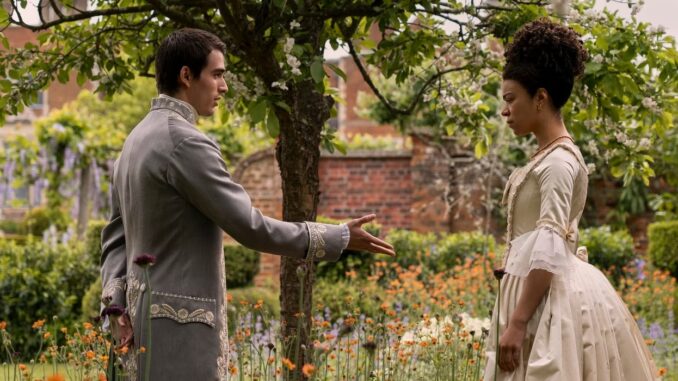
When Bridgerton has given us lines as a passionately shouted “When one burns for someone who does not feel the same,” and the barely restrained “You are the bane of my existence, and the object of all my desires,” the swoon factor becomes hard to top. Until, of course, Queen Charlotte: A Bridgerton Story offers a tearful argument that resolves months of tension and anger, ending in a confession of love that includes the phrase “my heart calls your name.” Sorry, Simon (Regé-Jean Page) and Anthony (Jonathan Bailey): King George (Corey Mylchreest) has taken the crown for the swooniest man in the Bridgerton-verse, but why?
What makes all of these men so swoony — and really, they are all heartthrobs in their own way — is that Bridgerton excels at giving us men-written-by-a-woman energy, and if there’s one thing that is downright swoonworthy every time , it’s a man with written-by-a-woman” energy. From Emma’s Mr. Knightley to Vikings: Valhalla’s King Canute, New Girl’s Nick Miller to ER’s Dr. Kovac, and every man written by a woman in between, what unites them is this romance hero quality. They are kind, especially to their love interests. They listen and do the right thing, or at least try to. They’re intuitive and considerate — essentially, they’re exactly the kind of man you’d find in a romance novel, which the world of Bridgerton is based on.
From the audience’s first introduction to George, he set out to win our hearts. The premise of the series being an arranged political marriage meant that we weren’t necessarily going to get lots of him and Charlotte (India Amarteifio) together right away. Where Simon held Daphne (Phoebe Dynevor) at arm’s length for as long as possible, even after they were married, and Anthony simply decided he would not be inspired his feelings for Kate (Simone Ashley) until the worst possible time — read: his wedding day… where her sister was the bride — George is open from the outset that he wants this relationship with Charlotte to work. She claims she knows nothing about him, and his first instinct is to functionally list off his Bumble profile: education, interests, favorite foods and hobbies, and those three fun facts to get a conversation going. Is it less than ideal circumstances? Of course, but there is something achingly romantic about a man who wants to at least try and make it work for both of them, when no aspect of society would fault him for marrying her and then going about business as usual.

George III Is the King of Consent
When George and Charlotte first met on their wedding day, he caught her trying to scale the garden wall to make a run for it. Amused as he might be, it’s clear he doesn’t want her to go. The intention might have been because he saw political advantage in it, but he’s also immediately charmed by how feisty and direct Charlotte is. As much as he wants her to stay, at that moment he also does what no one else in Charlotte’s life has ever done: he gives her a choice. His wishes are clear, but if she doesn’t want to marry him, and is that desperate to leave, then he will respect her decision.
Once they do get married, but before they progress to their relationship of “even days,” George and Charlotte have their overdue wedding night. Charlotte arrives armed only with the vaguest notion of what’s actually supposed to happen during sex, and the illustrations from Lady Danbury (Arsema Thomas) probably didn’t help much. While all three Bridgerton heroes thus far have been attentive lovers, there’s something earnest and, yes, swoonworthy in the way George listens to Charlotte’s concerns, assures her that her head does not need to repeatedly slam into the headboard, and then repeatedly continues to check in with her. Explicit, ongoing, and enthusiastic consent seems like such a basic bar to clear, and yet it’s surprising how rarely that happens in visual media.
George Would Do Anything for Love
George and Charlotte get together much earlier than either Simon and Daphne or Anthony and Kate, but they still spend a good chunk of the season apart. Even though it takes until Episode 5 for George to confess his love, unlike Simon and Anthony, he never spends any time actively denying how he feels about his wife. He doesn’t try to marry her off to someone else or marry someone else himself out of a distorted sense of duty. In fact, it is what he believes is his duty to his wife that leads to one of the more heartbreaking subplots in Queen Charlotte.
As a whole, the series steers clear of giving George III a concrete mental health diagnosis, as the matter is up for some historical debate. All we know — and really all we need to know — is that George’s condition makes him feel like he’s an inadequate partner for Charlotte, to say nothing of the pressures that are put on him as a monarch.